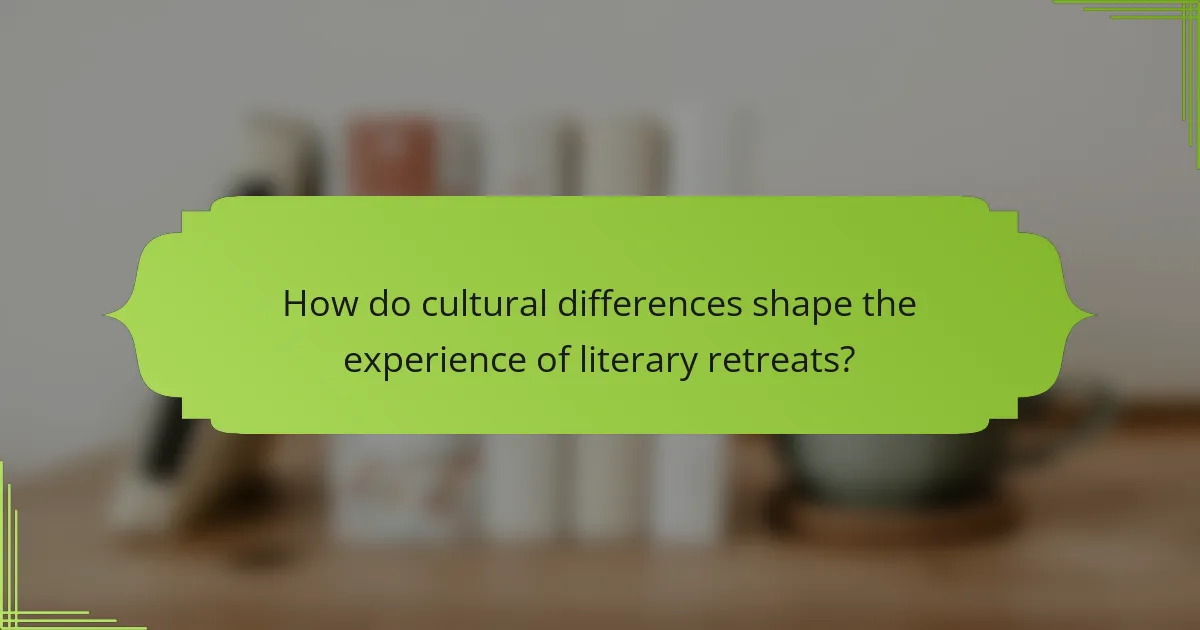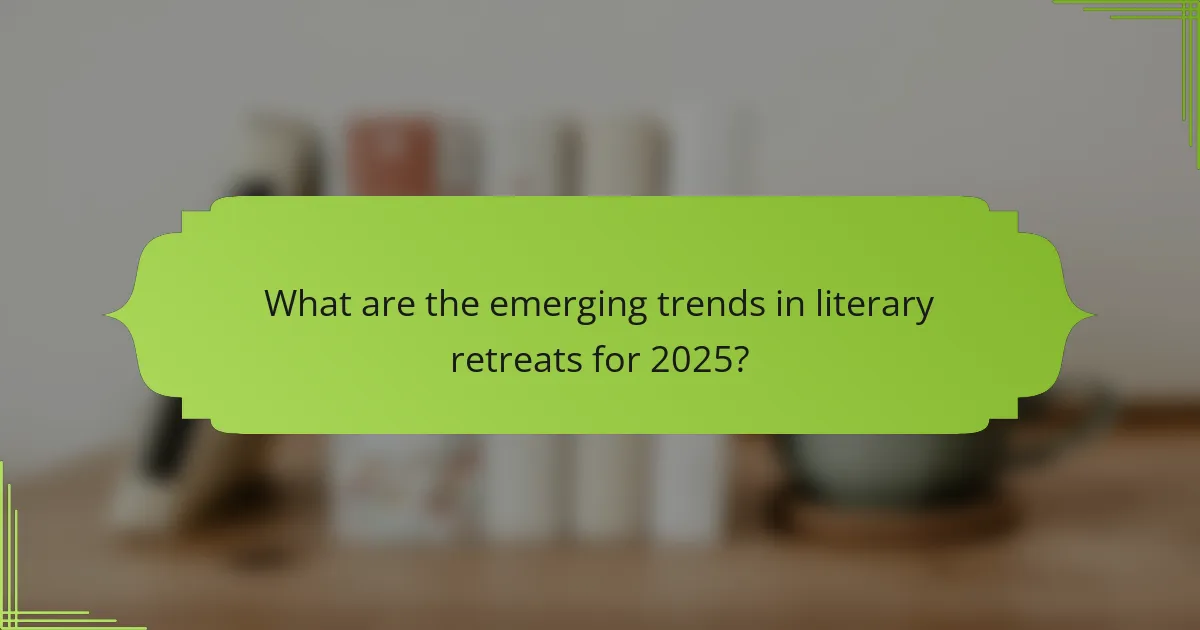Immersive literary retreats provide creative writers with focused environments that enhance creativity and foster community. These retreats feature workshops led by experienced authors, allowing for deep reflection and personalized feedback. Participants engage in unique settings that inspire innovation while building lasting connections with fellow writers. Emerging trends in 2025 emphasize personalization, technology integration, and diverse themes, making these retreats more accessible and inclusive.

What are the key benefits of immersive literary retreats for creative writers?
Immersive literary retreats offer significant benefits for creative writers. They provide focused environments that enhance creativity, foster community, and encourage skill development.
Writers experience uninterrupted time to explore their craft, allowing for deep reflection and experimentation. Such retreats often feature workshops led by experienced authors, providing valuable feedback and guidance.
Additionally, the shared experience with fellow writers cultivates a supportive network, facilitating collaboration and inspiration. This communal aspect can lead to lasting friendships and professional connections.
Finally, immersion in a unique setting often sparks new ideas, driving innovation in writing styles and themes. Overall, these retreats significantly enrich the creative process for writers.
How do these retreats enhance creativity and inspiration?
Literary retreats enhance creativity and inspiration by providing immersive environments that stimulate the mind. These settings often feature workshops led by experienced writers, encouraging participants to explore new techniques and perspectives. Additionally, the tranquil surroundings promote reflection and deep thinking, allowing writers to connect with their creative instincts. Engaging with fellow writers fosters collaboration and idea exchange, further igniting inspiration.
What role does community play in the writing process during retreats?
Community plays a crucial role in the writing process during retreats by fostering collaboration and support among writers. This environment encourages sharing diverse perspectives, enhancing creativity and motivation. Writers often benefit from peer feedback, which can refine their work and inspire new ideas. Additionally, communal activities promote a sense of belonging, helping individuals overcome isolation often associated with writing. The shared experience of a retreat creates lasting connections that extend beyond the event, enriching each writer’s journey.
How do immersive environments impact writing productivity?
Immersive environments significantly enhance writing productivity by fostering creativity and reducing distractions. These settings provide writers with inspiration and a focused atmosphere that encourages deep engagement. Studies show that natural surroundings, such as forests or beaches, can improve cognitive function and creative thinking, leading to more productive writing sessions. Additionally, retreats designed for writers often include structured schedules and peer support, further boosting motivation and output.

Which types of literary retreats are most popular among writers?
Writers often favor immersive literary retreats that offer inspiration and community. Popular types include nature retreats, urban writing workshops, and genre-specific gatherings.
Nature retreats provide serene environments, fostering creativity through natural beauty. Urban writing workshops often feature local literary scenes, encouraging collaboration and networking. Genre-specific gatherings focus on particular styles, allowing writers to refine their craft with like-minded peers.
These retreats typically last from a weekend to several weeks, accommodating various schedules. Writers appreciate the opportunity to disconnect from daily life and immerse themselves in their work.
What distinguishes workshops from retreats in the writing community?
Workshops focus on skill-building and structured learning, while retreats emphasize creative exploration and personal reflection. Workshops often include lectures and critiques, whereas retreats provide a supportive environment for writers to immerse themselves in their craft. Both serve unique purposes in the writing community, catering to different needs and experiences.
How do location and setting influence the type of retreat offered?
Location and setting significantly shape the type of literary retreat offered. Natural surroundings inspire creativity, while urban environments can provide access to literary resources. Each setting influences the retreat’s activities, atmosphere, and overall experience for writers. For instance, coastal retreats may emphasize relaxation and reflection, while mountain retreats often focus on solitude and inspiration. Additionally, the cultural context of a location can enhance the retreat’s theme, offering unique perspectives that enrich participants’ writing journeys.

What unique experiences can writers expect at different literary retreats?
Writers can expect diverse unique experiences at literary retreats, fostering creativity and collaboration. These retreats often emphasize immersive environments, such as serene nature settings or historic landmarks, enhancing inspiration. Workshops led by established authors provide personalized feedback, while networking opportunities with peers encourage meaningful connections. Additionally, some retreats offer specialized themes, like poetry or memoir writing, catering to specific interests. Unique attributes include tailored mentorship and access to literary agents, which can significantly impact a writer’s career trajectory.
How do themed retreats cater to specific genres or writing styles?
Themed retreats cater to specific genres or writing styles by providing tailored environments and activities that enhance creativity. These retreats often focus on specific literary forms, such as poetry or fiction, allowing participants to immerse themselves in relevant workshops and discussions.
For example, a poetry retreat may feature sessions on meter and imagery, while a fiction retreat emphasizes character development and plot structure. This targeted approach creates a supportive atmosphere where writers can explore their unique voices and styles.
Additionally, themed retreats often include guest authors who specialize in the genre, offering insights and mentorship. This unique attribute enriches the experience, helping writers refine their craft and connect with like-minded peers.
As a result, these immersive experiences foster deeper engagement with the writing process, enhancing both skill and inspiration.
What are some notable retreats led by renowned authors or literary figures?
Notable retreats led by renowned authors include the Tin House Writers Workshop, held annually in Oregon, and the Kenyon Review Writers Workshop in Ohio. These programs offer immersive experiences, expert guidance, and networking opportunities for creative writers. Other significant retreats are the Bread Loaf Writers’ Conference in Vermont, known for its rich literary history, and the Iowa Writers’ Workshop, which emphasizes intensive writing workshops and mentorship. Each retreat provides unique attributes, such as location, duration, and faculty, catering to various writer needs.

What challenges do writers face when choosing a literary retreat?
Writers face several challenges when choosing a literary retreat, including cost, location, and the type of experience offered. Budget constraints can limit options, while accessibility to the retreat location may affect participation. Writers also seek specific environments conducive to creativity, which can vary significantly across retreats. Additionally, the duration of the retreat and the presence of supportive community or mentorship can impact the overall experience.
How can writers assess the quality and credibility of a retreat?
Writers can assess the quality and credibility of a retreat by researching the facilitators, reading reviews, and evaluating the curriculum. Check the background of instructors to ensure they have relevant experience. Look for testimonials from past participants to gauge satisfaction. Review the retreat’s schedule and activities to confirm they align with your goals.
What factors should be considered regarding cost and value?
Cost and value in literary retreats depend on location, duration, amenities, and instructor expertise. Consider the retreat’s unique offerings, such as personalized feedback and networking opportunities. Additionally, assess the overall experience versus financial investment for maximum benefit.

How do cultural differences shape the experience of literary retreats?
Cultural differences significantly shape the experience of literary retreats by influencing interactions, themes, and creative expressions. Writers from diverse backgrounds bring unique perspectives, enriching discussions and fostering collaboration.
Cultural settings often dictate the themes explored during retreats, allowing participants to engage with local narratives and traditions. For example, a retreat in Japan may emphasize Zen philosophies, while one in Ireland may focus on folklore.
Additionally, cultural norms impact social dynamics, affecting how writers share feedback and critique each other’s work. Respect for hierarchy or collectivism can lead to varied communication styles, influencing the overall atmosphere of the retreat.
Ultimately, these cultural nuances create a rich tapestry of experiences, enabling writers to grow creatively and personally through their interactions with different literary traditions.
What regional variations exist in retreat formats and offerings?
Regional variations in retreat formats and offerings reflect diverse cultural influences and creative practices. For instance, retreats in the United States often emphasize structured workshops and peer feedback, while those in Europe may focus on immersive experiences in nature. In Asia, retreats frequently incorporate mindfulness and meditation, enhancing creativity through holistic approaches. Each region tailors its offerings to resonate with local traditions and writer preferences.
How do local literary traditions influence retreat themes and activities?
Local literary traditions significantly shape retreat themes and activities by integrating regional storytelling, cultural practices, and historical contexts. These elements foster a unique atmosphere that inspires creativity among writers. For instance, a retreat in the American South may emphasize Southern Gothic literature, incorporating local folklore and cuisine into workshops. Similarly, retreats in regions with rich poetic histories might focus on verse forms and oral traditions, encouraging participants to engage deeply with their surroundings. This connection enhances the immersive experience, allowing writers to draw inspiration directly from the local literary landscape.

What are the emerging trends in literary retreats for 2025?
Emerging trends in literary retreats for 2025 focus on personalization, technology integration, and diverse themes. Personalized experiences cater to individual writer needs, enhancing creativity. Technology integration includes virtual reality and online workshops, expanding accessibility. Diverse themes such as social justice and environmental writing attract a broader audience. Additionally, community-building activities foster collaboration among participants. These trends reflect a shift towards immersive and inclusive experiences in literary retreats.
How is technology being integrated into the retreat experience?
Technology enhances the retreat experience by facilitating immersive learning and networking opportunities. Virtual workshops and online platforms allow writers to connect with mentors and peers worldwide. Digital tools like writing apps and collaborative software streamline the creative process. Additionally, augmented reality experiences can bring literary themes to life, enriching participants’ engagement. These integrations create a dynamic environment that supports creativity and inspiration.
What new formats are being explored to enhance writer engagement?
Literary retreats are exploring new formats like virtual reality experiences and interactive workshops to enhance writer engagement. These innovative approaches allow writers to immerse themselves in diverse environments and foster creativity. For instance, virtual reality can simulate historical settings, while interactive workshops encourage collaboration and real-time feedback. Such formats are designed to stimulate inspiration and deepen the writing process, making literary journeys more impactful.
How are retreats adapting to the evolving needs of writers?
Retreats are evolving to meet writers’ needs by offering personalized experiences and diverse formats. These adaptations include workshops, mentorship opportunities, and flexible schedules that accommodate varying writing styles. Many retreats now incorporate digital platforms, allowing remote participation and access to resources. Additionally, themes focusing on mental wellness and community building are becoming prevalent, fostering deeper connections among writers.
What best practices can writers follow to maximize their retreat experience?
To maximize their retreat experience, writers should establish clear goals, engage in daily writing practices, and participate in group discussions. Setting specific objectives helps focus creativity. Consistent writing enhances skill and productivity. Group interactions foster feedback and inspiration. Embracing the retreat environment promotes immersion and relaxation, essential for creative flow.